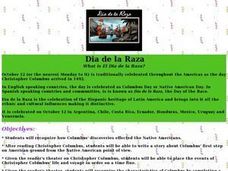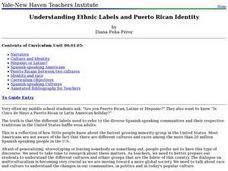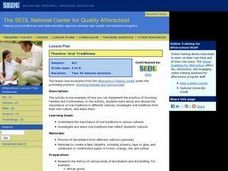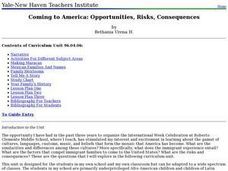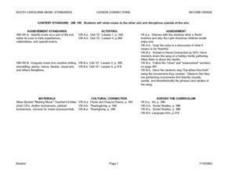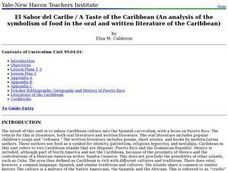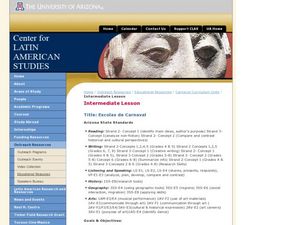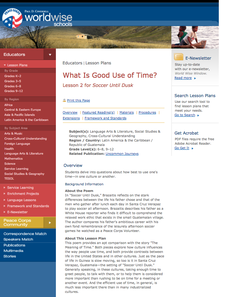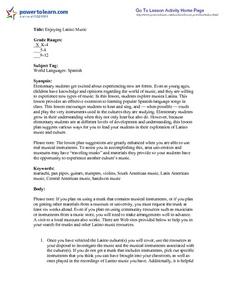Curated OER
Dia de la Raza - What is El Dia de la Raza?
Students research and write about Christopher Columbus, his voyages, and his impact on the Native Americans. In this Christopher Columbus lesson, students work at stations where they learn vocabulary, perform Reader's Theatre, work with...
Curated OER
Education in Colonial New England
Fifth graders examine schooling now and in New England Colonies. For this compare and contrast lesson, 5th graders describe schools of the present to schools of the past. Students also investigate the goals of schooling and the part...
Curated OER
Understanding Ethnic Labels and Puerto Rican Identity
Students brainstorm a list of stereotypes associated with the Hispanic or Latin culture. In groups, they use the internet to research issues of importance to the Puerto Rican community. They focus on the cultures that speak Spanish and...
Curated OER
What's Being Done?
Students explore the concept of animal welfare. In this philanthropy lesson, students examine legislation that supports animals in their state as well as the role of the American Society for the Prevention of Cruelty to Animals....
Curated OER
The Rooster Who Went to His Uncle's Wedding
Second graders read and discuss the story "The Rooster Who Went to His Uncle's Wedding" in the Scott Foresman series. They summarize the story. They understand the influence of Latin American Folktales. They complete a quiz on the story.
Curated OER
Make A Pinata
Students work cooperatively to create pinatas using balloons, old newspapers, flour, water, tempera paints, string, scissors, and candy in this excellent lesson for the Elementary classroom. This can be ties into a unit of study on...
Curated OER
Theatre: Oral Traditions
Young scholars investigate cultural traditions. In this multi-cultural lesson, students discuss various cultures and research their traditions.
Curated OER
Coming to America: Opportunities, Risks, Consequences
Students examine the immigrants of various cultures throughout the world. In groups, they identify the push and pull factors of those immigrating and the risks and consequences they are subject do when going through the immigration...
Curated OER
Spain and France Influence in Europe and in the New World
Students examine the conditions in France and Spain during the Middle Ages and the Discovery of America. In groups, they compare and contrast the political situations in both countries and what effect they had on the New World. To end...
Curated OER
Music And The Related Arts / Fiesta
Second graders investigate the concept of a celebration through the experience of music and culturally relevant conversation. They have a class discussion about thankfulness and tie it the tradition of celebration. Then students listen...
Curated OER
Translating Traditions
Learners analyze art reflective of traditions and cultural heritage. In this art analysis lesson plan, students complete image based discussion.
Curated OER
George Gershwin
Pupils explore the life and accomplishments of George Gershwin. They listen to Latin rhythms and practice the rhythmic parts. Students identify Latin instruments George Gershwin added to the orchestra. After practice, they perform a...
Curated OER
Hispanic World - South America Field Trip
Students research a South American Spanish speaking country, analyze and organize the information that they collect and present their findings to the class.
Curated OER
Compare and Contrast Culture
Fifth graders compare and contrast the cultures of American culture with that of the other cultures of North America. Using traditional and Internet research, 5th graders gather data on one element of culture for comparison. Data...
Curated OER
A Taste of the Caribbean
Students are introduced to the foods and traditions of the Caribbean. In groups, they brainstorm their own definition of culture and review the physical and political geography of the Caribbean. They spend time sampling different foods...
Curated OER
Escolas de Carnaval
Students create a carnival display displaying the different themes they have studied. In this carnival lesson plan, students display the work they have studied through the samba schools in Brazil. Students also incorporate music in their...
Curated OER
Tango Stories
Students listen to tango music and research the country it came from. In this music lesson plan, students find that tango music comes from Argentina. They listen and dance to the music and then write stories.
Curated OER
Puerto Rico: The 51st State?
Learners research the history of Puerto Rico, its culture, and geography. In this Puerto Rico lesson, students find Puerto Rico on a map and find specific regions or cities. Learners discuss Puerto Rico's statehood and listen to salsa...
Curated OER
Puerto Rico: The 51st State?
Students examine the political status of Puerto Rico. In this global studies lesson plan, students explore Puerto Rico and consider the feelings of Puerto Ricans regarding their unique political status.
Curated OER
Did You Know...
Pupils research about hispanic history. They complete a true-false worksheet together or in groups. They discover achievements by hispanic members of society.
Curated OER
What Is Good Use of Time?
Young scholars delve into questions about how best to use one's time-in one culture or another. They explore the kinds of choices students will make about their use of time and consider the statement: "We are shaped by the values of the...
Curated OER
Enjoying Latino Music
Learners view different musical instruments from around Latino world, predict what sounds instruments will make based on their appearance, listen to and evaluate music from different Latino genres orally or in writing, and make...
Curated OER
Border Forum
Students read, analyze, and synthesize news reports on a current border issues. They prepare an oral presentation and written support documents which must clearly and accurately explain an issue to an audience which may be unfamiliar...
Curated OER
Border Legends, Myth, & Folklore
Students examine the narrative forms and tales unique to the U.S.-Mexico border. They discuss the possible sociological meanings of these stories, and then write their own versions to demonstrate that they explain the forms.


